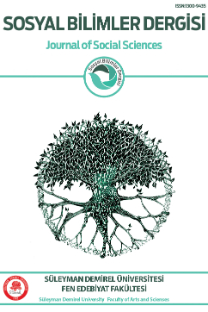Between Longstanding Hostilities and Unwanted Alliances - the Crucial Aspects of Balkan Policy of Albanian State in Twentieth Century
Text analyses the evolution of Albanian State in Balkans during Twentieth Century, as a State created with the important influence of external factors. The specific process of exemplification and stregthening of Albania based on the unique model of relations with Balkan states and European Powers. Endangered by policy of neighbour States, Albania choose the way of regular changes of strategic partners. These source of these changes one can find in the "fear of division" and also in ideological orientation. In this article, Albanian attempts for the strengthening of its statehood were seen mainly as a sign of fear for political and economic isolation. The effectiveness of these efforts was verificated in the last decade of Twentieth Century, when the regional crisis testimony that Albania became crucial stability factor in the Balkans.
___
Alia Ramiz, Jeta ime. Kujtime, (Tirana, Botimet Toena, 2010)British documents on the origins of the war 1898-1914, vol. IX, part.2, (London 1934).
Chekrezi, Constantin, Albania - Past and Present, (New York, The MacMillan Company, 1919)
Close, David, Greece since 1945. Politics, Economy and Society, (London, Longman Publishing House, 2002).
Czekalski Tadeusz, Albania w latach 1920-1924: aparat panstwowy i jego funkcjonowanie, (Katowice, Slaska Agencja Prasowa, 1998).
Czekalski Tadeusz, Pólnocny Epir i Czamuria - wspólczesne oblicze sporu grecko-albanskiego, [in:] Naród - panstwo- Europa Srodkowa w XIX i XX wieku, ed. Artur Patek, Wojciech Rojek, (Krakow, Wydawnictwo Uniwersytetu Jagiellonskiego, 2006).
Evered Emine, Empire and Education Under the Ottomans: Politics, Reform and Resistance from the Tanzimat to the Young Turks, (London & New York, I.B.Tauris, 2012).
Frashëri, Kristo, Historia e levizjes së majte ne Shqipëri dhe themelimin të PKSh-se 1878-1941 (veshtrim historik me nje shtojce dokumentare), (Tirana, Akademia e Shkencave e Shqipërise, 2006).
Goldman, Minton F.Revolution and Change in Central and Eastern Europe: Political, Economic, and Social Challenges, (New York, M.E. Sharpe, 1997)
Hoxha, Enver, Dy popuj miq pjesë nga ditari politik dhe dokumente të tjera për marrëdhëniet shqiptarogreke, 1941-1984, (Tirana, Shtepia Botuese 8 Nentori, 1985).
Kola, Paulin, In search of Greater Albania, (London, C. Hurst & Co. Publishers, 2003).
League of Nations, Official Journal, 1921/8.
Mackenzie, Georgina Muir; Irby, Paulina, Travels in the Slavonic Provinces of Turkey-in-Europe, (London, Alexander Strahan, 1866).
Milo Paskal, Shqipëria dhe Jugosllavia 1918-1927 (Tirana, 8 Nentori, 1991).
Pouqueville, François, Travels in the Morea, Albania, and other parts of the Ottoman empire, (London, Barnard & Sultzer, 1820)).
Puto, Arben, Historia diplomatike e çeshtjes shqiptare, (Tirana, Akademia e Shkencave, 2003).
Puto, Arben, Qeveria e Vlores përballe Komisionit Nderkombetar te Kontrollit, Studime Historike No. 3, 1976.
Sadikaj Dilaver, Politika e jashtme e shtetit shqiptar ne vitet '80, Studime Historike No. 1-2, 1999.
Skoulidas, Elias, The Perception of the Albanians in Greece in the 1830's and 40's: The Role of the Press, [in:] Albanian Identities. Myth and History, ed. S. Schwandner-Sievers, B. Fischer, (London 2002).
Smyth, Warington, A Year with the Turks or Sketches of Travel in the European and Asiatic Dominions of the Sultan, (New York, 1854).
Tomes, Jason, King Zog Self-Made Monarch of Albania, (London, Sutton Publishing, 2003).
Zeri i Popullit, June 2, 1986.
Stefanovic, ?or?e, Seeing the Albanians through Serbian Eyes: The Inventors of the Tradition of Intolerance and Their Critics, 1804-1939, European History Quarterly No. 3, 2005, p.465-492.
Ushtelenca, Ilir, Diplomacia e mbretit Zogu Ire, (Tirana, 1995).
Weiner, Rober, Change in Eastern Europe, (London 1994), p.147.
Zivotic, Aleksandar, Jugoslavija, Albanija i velike sile (1945-1961), (Belgrad, Archipelag INIS, 2011)
- ISSN: 1300-9435
- Yayın Aralığı: Yılda 3 Sayı
- Başlangıç: 1995
- Yayıncı: Süleyman Demirel Üniversitesi, Fen-Edebiyat Fakültesi
Sayıdaki Diğer Makaleler
Unwelcome Citizens: Muslim Turks of Greece and Orthodox Greeks of Turkey
World War I in the Balkans, 1914-1918 - Third Balkan War?
Ali Pasha Tepelena in the Turkish Historiography of Republican Era and Morean Uprising of 1821
Ottoman Heritage in the Balkans: The Ottoman Empire in Serbia, Serbia in the Ottoman Empire
Croatian-Slavonian Military Troops on European (Balkan) Battlefields During World War I
